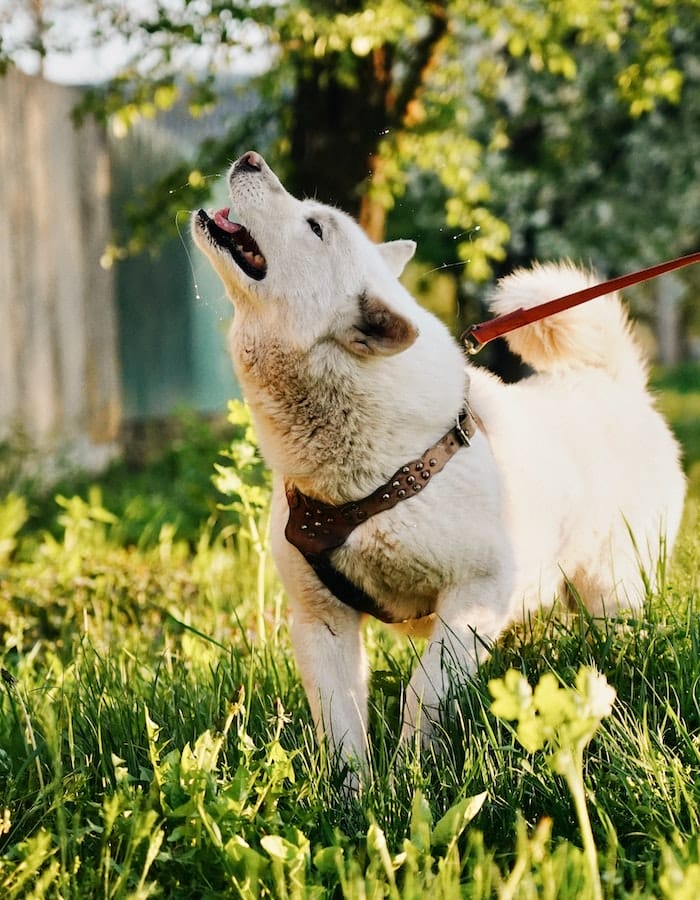
If you have a dog that barks excessively, you know how frustrating it can be. Not only is it loud, but it can also be disruptive and annoying.
Dogs bark for many reasons- boredom, anxiety, excitement, and fear are just a few.
In this blog post, we will discuss some tips on how to make your dog stop barking.
We will cover everything from understanding why your dog is barking to training your dog to obey basic commands.
What are the causes of your dog’s barking?

There are a few reasons why dogs bark, including:
Separation Anxiety
One of the most common causes of excessive barking in dogs is separation anxiety.
Separation anxiety is a condition that occurs when a dog becomes anxious or stressed when separated from its owner.
Dogs with separation anxiety may bark excessively, destroy furniture, have accidents in the house, and become depressed or anxious when left alone.
Boredom
Another common cause of the excessive barking is boredom. Dogs who are bored may bark out of frustration or because they are seeking attention.
Bored dogs may also engage in other destructive behaviors, such as chewing on furniture or digging holes in the yard.
Fear
Fear is another common trigger for excessive barking in dogs. Dogs may bark excessively if they are afraid of loud noises, unfamiliar people or animals, or new environments.
Fearful dogs may also tremble, cower, and hide when confronted with their triggers.
Excitement
Dogs may also bark excessively out of excitement or anticipation, such as when they see their owner picking up their leash or getting ready to go for a walk.
Excited barking may also occur during playtime or when greeting visitors.
Pain
Sometimes, dogs may bark excessively due to pain or discomfort. If your dog is suddenly barking more than usual, it could be a sign that they are injured or ill.
If your dog is barking and seems to be in pain, it is important to take them to the vet for an examination.
Understanding the reasons for your dog’s excessive barking is an important step in correcting the behavior.
Once you have determined the underlying cause, it will be easier to address and work on finding a solution.
How to make a dog stop barking?

There are several things you can do to stop your dog stop barking. It includes:
Don’t yell
One of the worst things you can do when your dog is barking is to yell at them. This will only serve to excite them and make the barking worse.
Dogs bark for a variety of reasons, but they also bark because they are trying to get a reaction from you.
If you yell at them, they will think they are successful in getting your attention and are likely to continue barking.
Identify the cause
Before you can stop your dog from barking, you need to identify the cause of the barking.
There are many different reasons why dogs bark, including boredom, fear, anxiety, and hunger. Once you know what is causing the barking, you can begin to address the issue.
Provide exercise
One of the best ways to stop a dog from barking is to provide them with plenty of exercises.
A tired dog is a good dog, and if your dog is getting enough exercise, it will be less likely to bark out of boredom or frustration.
Take your dog for walks or runs regularly, and make sure they have plenty of toys to keep them occupied when they are indoors.
Address anxiety and fear
If your dog is barking out of anxiety or fear, it is important to address those issues as well.
Dogs that are anxious or afraid may bark excessively in an attempt to protect themselves or their owners.
If you think your dog may be suffering from anxiety or fear, talk to your veterinarian about possible treatment options.
Give them Attention
Dogs bark for attention just as much as they bark for any other reason.
If you are ignoring your dog or giving them very little attention, it may start barking in an attempt to get your attention.
Make sure you are spending enough time with your dog and giving them the affection they need on a daily basis.
Be consistent with training
If you are working on training your dog not to bark excessively, it is important to be consistent with the training.
Dogs learn best through consistency and repetition, so if you only work on the training occasionally, your dog is not likely to make much progress.
Set aside some time each day to work on the training, and stick with it until your dog has mastered the desired behavior.
Use positive reinforcement
It is also important to use positive reinforcement when training a dog not to bark excessively. Praise your dog when they are not barking and give them treats as a reward for good behavior.
Avoid using punishment or yelling, as this can cause unnecessary stress for your dog and may worsen its barking behavior.

Final words
Dogs bark for a variety of reasons. While some dogs may bark excessively in response to external stimuli, others may bark due to internal emotional turmoil.
If your dog is barking excessively, it is important to first consult with a veterinarian or animal behaviorist to rule out any underlying medical conditions.
If no medical condition is present, there are a number of training techniques that can be used to help reduce or eliminate excessive barking.
One such technique is positive reinforcement, which involves rewarding your dog whenever he or she exhibits desired behaviors, such as remaining quiet.
With patience and consistency, most dogs can learn to control their barking habits.
- Does Cat Litter Melt Ice? The Complete Guide to Winter Safety - January 30, 2026
- Happy Tail Dogs: Understanding This Common Canine Condition - January 29, 2026
- How Cold Can Outdoor Cats Handle? Feline Winter Safety - January 27, 2026


GIPHY App Key not set. Please check settings